Issue Wrap No. 487, September 20, 2010
Highlights from the EO print edition, Issue Wrap No. 487, September 20
Tax System Reform: What's on the Agenda for 2011-2015
News, cover
~ The Ministry of Finance, along with some other ministries, is soliciting opinions on reforms to the country's financial and taxation system to take place during the upcoming 12th Five-Year Plan period (2011-2015).
~ According to sources, the reform of personal income tax will be completed during the period and value-added tax, which is currently China's largest source of tax revenue, will be expanded to replace the current business revenue tax.
~ The reform will also focus on issuing a property tax (物业税). However, with a paucity of detailed information in regard to housing ownership, it remains almost impossible for the central government to implement the tax anytime soon.
Original article: [Chinese]
Local Land Departments to Retreat from Land Development Market
News, page 3
~ As of April 2011, the Ministry of Land and Resources (MLR) will require local branches to completely separate themselves off from subsidiary agencies whose business is focused on or related to land development, .
~ The MLR intends to eliminate the corruption that currently exists in relation to the intitial development of land plots for further development - what is refered to as the the "first-level of the land development market" (土地一级开发市场) which not only refers to the provision of essential utilities such as plumbing, electricity etc but also relates to the acquisition, demolition and compensation related to resettlement of residents who previously lived in the area.
~ However, it may be difficult for the MLR to meet its goal since local governments are still playing the dual role of both managers and sellers.
~ Another reason the MLR's efforts may prove futile, lies in the relationship between local land reserve agencies and local governments. The former has to follow instructions made by the latter.
~ Separating local government from the market for initial land development is just one of the measures being implemented in an attempt to rid the sector of corruption. According to Huang Xiaowei, deputy director-general of the China Land Association, the central government should also regulate the behavior of local governments by applying a land grant fee.
Original article: [Chinese] 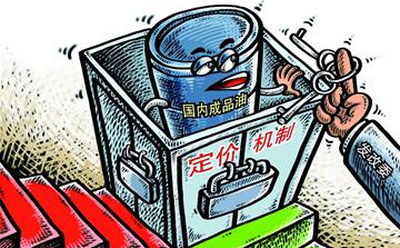
Pricing Mechanimsm of Refined Oil to be Changed
News, Page 4
~ After being in effect for more than one year, the refined oil pricing mechanism will be modified.
~ An evaluation conducted by the National Reform and Development Commission (NRDC) and several related agencies has led many officials to call for a shortening of the refined oil price adjustment period from 22 days to 10 days, while maintaining the 4% international price fluctuation guideline.
~ Some experts have suggested a gradual transition beginning with a 14-day adjustment period.
~ The prevailing opinion is that although the "4%+22 day" method enhanced transparency, the lengthy adjustment intervals also increased market response time, as well as encouraged speculation and commodities hoarding. Shortening the price adjustment period would allow Chinese refined oil prices to change more frequently and thus better reflect international prices.
~ Calls by Sinopec and other refining companies for more autonomy in oil pricing were rejected.
Original article: [Chinese]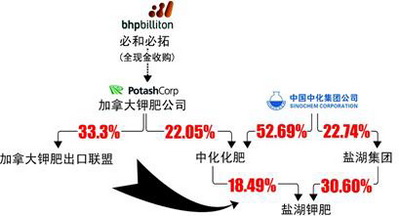
Sinochem Group Sumbits Request for Government Support of Potential Bid for Canada's Potash Corp
News, page 5
~ China's state-owned Sinochem Group has asked the government to provide support to any potential bid for Canada's Potash Corp.
~ Sinochem has submitted a written request to the relevant central government agencies arguing that as the international potash market is related to national food security, it's requesting government backing of a takeover bid.
~ According to sources close to the situation, Sinochem had already made a preliminary evaluation of a potential bid, which established that the group would need 40 to 60 billion US dollars to rival BHP in its offer.
~ Sinochem does not have sufficient funds to make the bid on its own, and would need to team up with another company.
~ Sinochem has been in touch with Singapore's sovereign wealth fund Temasek concerning a potential bid, but no deal has yet been reached.
Original article: [Chinese]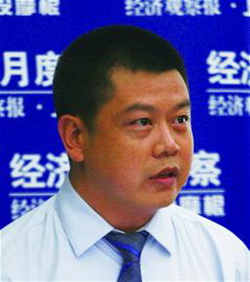 Economists: Threat of Inflation Slight - Deposit Rates will not Rise
Economists: Threat of Inflation Slight - Deposit Rates will not Rise
News, page 6
~ Although ordinary people seem to be worried by the continual increase in CPI, most economists remian unperturbed.
~ Zuo Xiaolei, leading economist with Galaxy Securities, has attributed the inflated CPI in July and August to rising food prices. She predicts the CPI of the second half of this year will be somewhere between 3% and 4% and believes it is impossible that the central bank will raise the deposit rate in the third quarter.
~ Dong Xianan, leading macro analyst with Industrial Securities, said after the most recent low point for the Chinese economy in June and July, the economy will now continue to expand. He also argued that there won't be any inflationaty pressure in the medium-term.
Original article: [Chinese]
China's International Board a Step Closer
Market, page 23
~ China has accelerated its effort to launch an International Board.
~ According to sources close to the high-level executives of the Shanghai Stock Exchange, the China Securities Regulatory Commission, the Ministry of Commerce and the State Administration of Foreign Exchange have agreed on laws concerning the launch of the International Board. The only matters that have not been settled are what technology will be used and when it will be launched.
Original article: [Chinese] 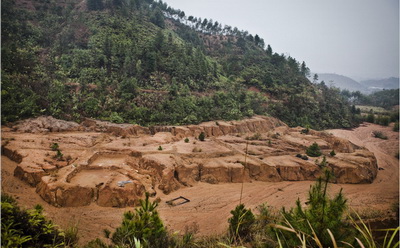
Three Enterprises to Control China's Rare Earth Sector
Corporation, page 26
~ Baotou Steel Group, Jiangxi Copper and China Minmetals currently dominate China's rare earth sector. With Baotou controlling 90% of rare earth located in northern China.
~ Baotou's dominance in the north heightened the competition for rare earth mines in the south.
~ China Minmetals has traditionally been Baotou's main competitor. The company expects to reach a rare earth separating capacity of 13,500 tons within 5 years and achieve over 10 billion yuan in sales.
~ According to an insider, China Minmetals has made progress in the south in separating and processing rare earth, but unlike Baotou, does not directly control rare earth mines.
~ Baotou recently invested 230 million yuan and added 11,500 tons to its rare earth separating capacity by integrating with 3 rare earth companies in Ganzhou, Jiangxi province.
~ Last June, Jiangxi Copper passed China Minmetals as the country's second largest rare earth provider. After several key integrations moves in 2008, Jiangxi Copper has consolidated the rare earth resources in Sichuan Province and is poised to compete with China Minmetals in the south and Baotou in the north.
~ According to plans drawn up by the Ministry of Industry and Information Technology, due to consolidation by the three major players, by 2015, the number of domestic companies engaged in rare earth processing will have fallen from 100 to 20.
~ On August 10, fifteen city governments in southern China issued the "Regional Program for the Joint-Regulation of Rare Earth Development," which will enforce a national price index on rare earth resources.
~ Baotou Steel Rare Earth and Jiangxi Copper are co-developing a uniform national pricing mechanism, and have already received support from certain local governments. They are preparing to submit their proposals to the government of the Inner Mongolia Autonomous Region for approval.
~ Cooperation between Baotou and Jiangxi may result in virtual monopoly control of the entire rare earth sector.
Original article: [Chinese] - Image via New York Times
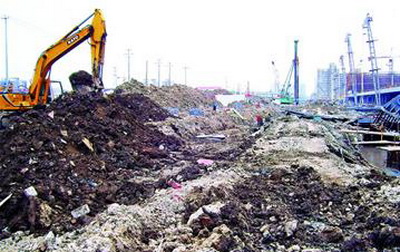
Restriction on Land Usage Puts Pressure on Industry in Western China
Nation, page 9
~ Adequate industrial land is one of the key reasons industry in the west of China attracts investment, but presently it seems like this abundance only exists in the minds of the people.
~ A local official from Xian described what he believes to be the reality of Xian's land distribution, "Every month we have a meeting discussing our land quota for several hundred mu (Chinese unit of measurement equal to one fifteenth of a hectare) of land. This amount is certainly insufficient for all of our counties and development zones."
~ A tightening of land quotas began in 2005. In 2004 a company in Jiangsu illegally occupied 6,000 mu of land and forced 4000 people to move. At that time new cities were being constructed all over the country; the amount of arable land was greatly reduced. The government was alarmed by the situation and introduced a 1.8 billion mu area limit to the amount of land allowed to be cultivated. From then on, officials paid great attention to land quotas.
~ In the past, it was mainly coastal areas which had land replacement quotas, but they are being seen more and more in places like Xian.
Original article: [Chinese]
Consortium of Banks Call in Huiyuan Juice Loan After Company's Debt Ratio Spikes
Corporation, page 25
~ It's been an eventful year for Huiyuan, following on from the recent announcemt that Danone was shedding their holdings in the company, and SAIF Partner's unexpected move to buy up the stock - now comes a report that the Huiyuan Juice has "broken a contract" in relation to a 250 million loan from a consortium of 18 banks that include ICBC Asia and Standard Chartered Bank.
~ According to multiple sources, on Sep 16, Huiyuan invited representatives from the banks to discuss the 250 million US dollar loan contract that Huiyuan Juice is said to have "broken" in Beijing - though, as of print time, we were unable to ascertain exactly how Huiyuan Juice is said to have "broken the contract."
~ The problems for Huiyuan Juice all stem from last March when the Ministry of Commerce blocked a merger of the company with Coca-Cola.
~ In the first half of this year, the company turned over 1.4 billion yuan in revenue, but still registered a loss of more than 70 million yuan. The debt ratio of Huiyuan Juice increased from 29.5% in 2009 to 70.3% in 2010.
Original article: [Chinese]
The views posted here belong to the commentor, and are not representative of the Economic Observer |
Related Stories
Popular

- BOOK REVIEW
- March 2011 Issue of EO's Book Review
- Highlights from this month's issue of EO's Book Review
Interactive
Multimedia

- EEO.COM.CN The Economic Observer Online
- Bldg 7A, Xinghua Dongli, Dongcheng District
- Beijing 100013
- Phone: +86 (10) 6420 9024
- Copyright The Economic Observer Online 2001-2011
















